Nano fish are species of fish that are under 3 inches in length — typically between 1 to 2 inches — and can be housed in small tank setups.
There are several saltwater and freshwater nano fish species available in the pet trade, including the neon tetra, chili rasbora, pajama cardinal, zebra danio, and blue neon goby. Each is unique in terms of care needs and characteristics.
TABLE OF CONTENTS
Best Freshwater Nano Fish
Some popular freshwater nano fish species are the neon tetra, cardinal tetra, harlequin rasbora, celestial pearl danio, clown killifish, and pygmy corydora.
Neon Tetra
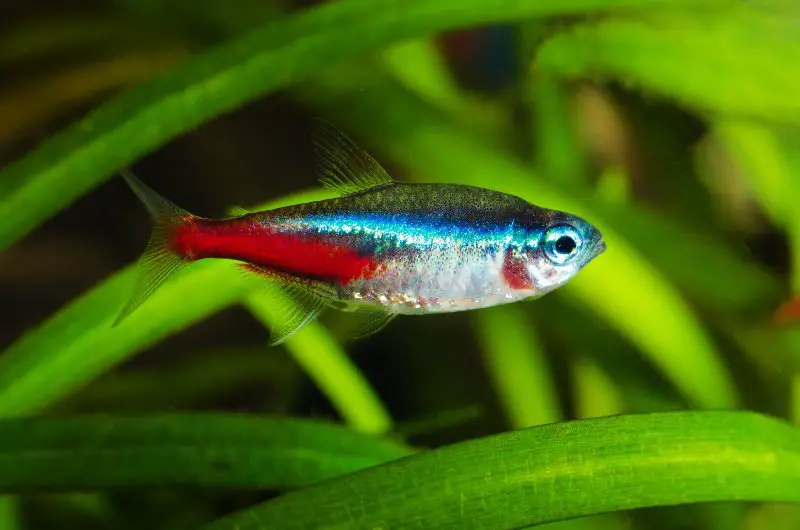
| Care level Easy | Temperament Peaceful | Color Blue, silver, iridescent, red markings | Lifespan 6 to 8 years | Size Up to 1.5 inches |
| Water temperature 70 to 81°F | Water pH 6 to 7 | Tank size 10 gallons | Diet Omnivore | Scientific name Paracheirodon innesi |
The neon tetra is an iridescent species native to the northern and western Amazon basins. Because of the fish’s adaptable nature, minimal care needs, and affordability, the neon tetra is one of the most popular species among beginner fishkeepers.
Neon tetras are omnivores that require a varied diet consisting of live and frozen foods, pellets, and plants. While generally peaceful, neon tetras are known for fin-nipping and shouldn’t be housed with long-finned, fancy species.
Neon tetras are particularly susceptible to neon tetra disease. Always buy neon tetras from reputable sellers, keep the tank parameters stable, and quarantine new fish for two to three weeks.
Cardinal Tetra
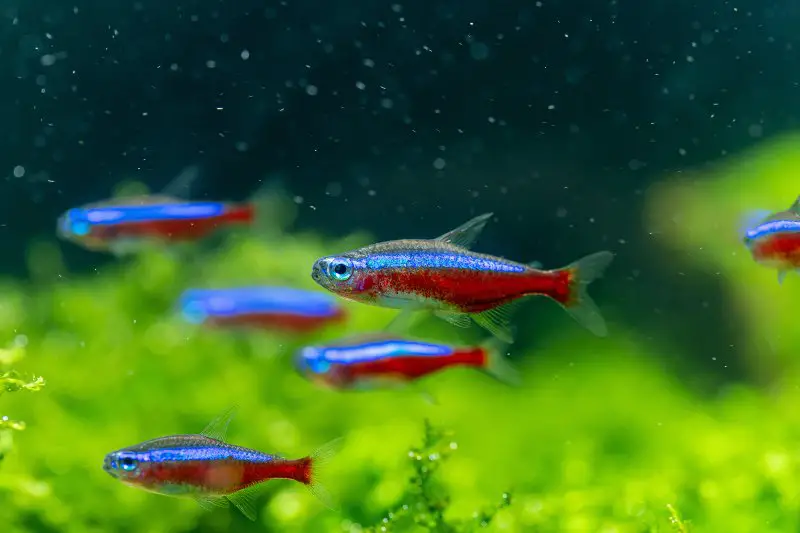
| Care level Moderate | Temperament Peaceful | Color Red with blue stripe | Lifespan 4 to 5 years | Size Up to 2 inches |
| Water temperature 73 to 81°F | Water pH 4.6 to 6.2 | Tank size 20 gallons | Diet Omnivore | Scientific name Paracheirodon axelrodi |
Endemic to the Orinoco and Negro River drainages in South America, the cardinal tetra is a small, peaceful fish that grows up to 2 inches in length. This species is known for its schooling behavior and is best kept in a group of six.
Cardinal tetras thrive in soft, slightly acidic, tannin-stained bodies of water in the wild. Replicate these conditions in captivity to help these fish feel safe and live long, healthy lives. Also provide a high-vitamin diet.
Harlequin Rasbora
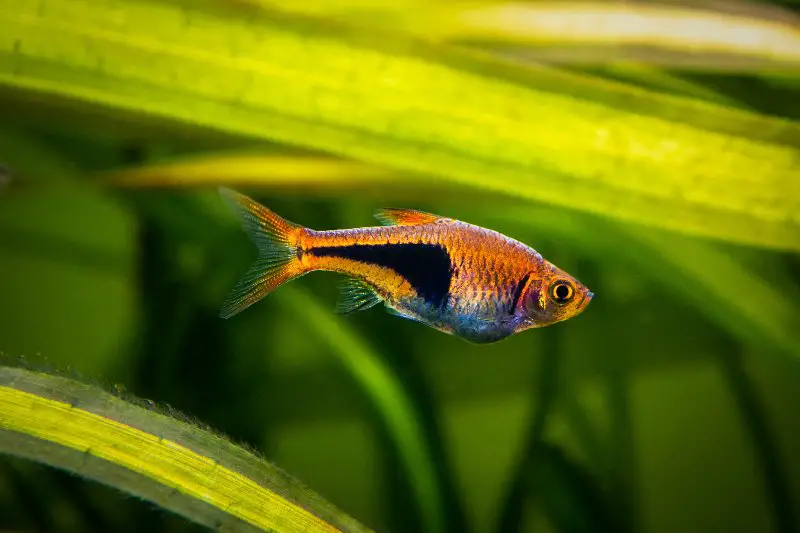
| Care level Easy | Temperament Peaceful | Color Orange-reddish body, black marking | Lifespan 5 to 8 years | Size Up to 2 inches |
| Water temperature 72 to 81°F | Water pH 6 to 7.8 | Tank size 10 gallons | Diet Omnivore | Scientific name Trigonostigma heteromorpha |
The Harlequin Rasbora is a small, freshwater species with a fiery-hued body. The fish is native to Southeast Asia, where it primarily lives in forest streams or vegetated swamps. Harlequin Rasboras are popular because of their adaptability, resistance to disease, and unfussy eating habits.
The Harlequin Rasbora requires a tank with plants, a gentle filtration system, and hiding spots. Keep the lighting low and use a dark-hued substrate to better show off the fish’s coloration.
Celestial Pearl Danio
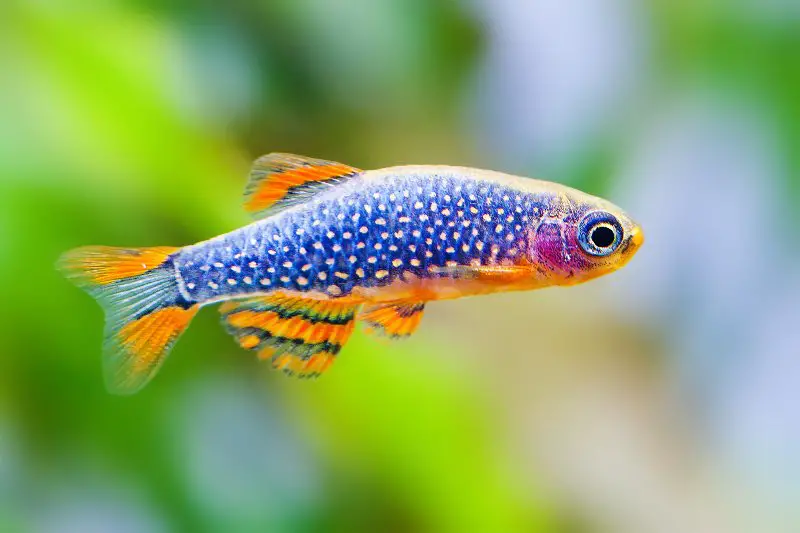
| Care level Moderate | Temperament Peaceful | Color Blue with white spots | Lifespan 3 to 5 years | Size Up to 1 inch |
| Water temperature 71 to 78°F | Water pH 6.5 to 7.5 | Tank size 10 gallons | Diet Omnivore | Scientific name Danio margaritatus |
The celestial pearl danio is a freshwater species known for its resemblance to a galaxy, with a dark blue body and star-like, spotted markings. The species grows up to 1 inch, has an average lifespan of three to five years, and is primarily found in freshwater ponds and river basins throughout Myanmar and northern Thailand.
Celestial pearl danios are moderately difficult to care for because they’re prone to stress and illness. However, stress can be prevented with a nutritious diet, hiding spots, frequent water changes, and ideal tank parameters. Keep celestial pearl danios with similar sized, peaceful species.
Clown Killifish
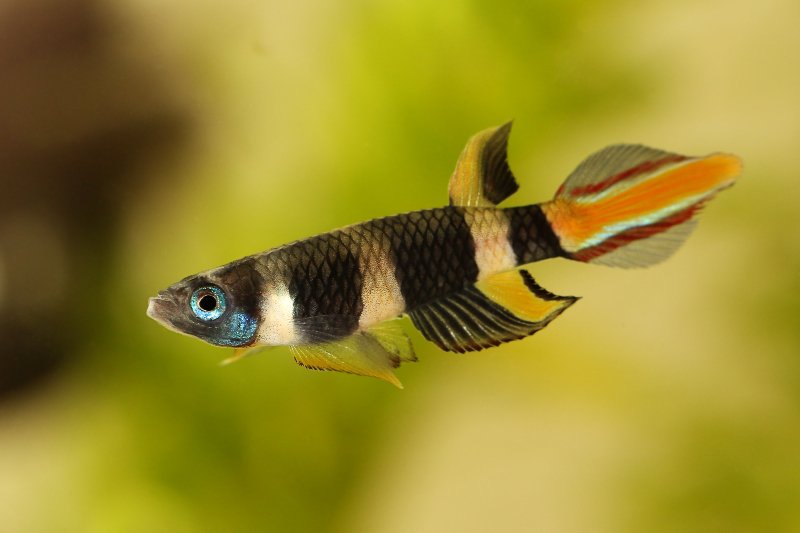
| Care level Moderate | Temperament Peaceful | Color Black and yellow stripes | Lifespan Up to 5 years | Size Up to 1.4 inches |
| Water temperature 68 to 79°F | Water pH 4 to 7 | Tank size 10 gallons | Diet Carnivore | Scientific name Epiplatys annulatus |
The clown killifish is a nano fish species known for its distinctive black and yellow bands. In the wild, the fish inhabits marshes, lowland swamps, streams, and various other small bodies of water. Most clown killifish live for five years in captivity with proper care.
Clown killifish are peaceful, shy fish that spend most of their time near the water’s surface. Invest in a secure lid because this species is known for jumping out of the tank.
Pygmy Corydora
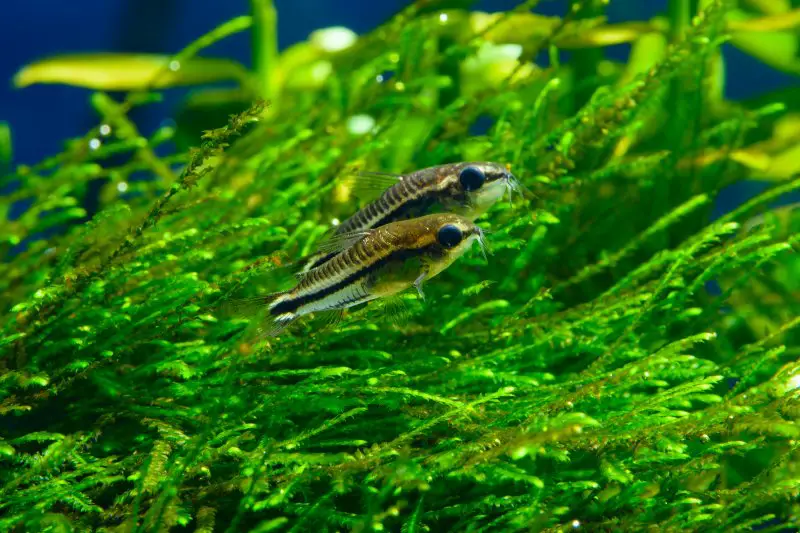
| Care level Easy | Temperament Peaceful | Color Silver with black stripe | Lifespan Up to 3 years | Size Up to 1.3 inches |
| Water temperature 72 to 79°F | Water pH 6.4 to 7.4 | Tank size 10 gallons | Diet Omnivore | Scientific name Corydoras pygmaeus |
The pygmy corydora, also known as the pygmy catfish, is native to the Madeira river basin situated in Brazil. Pygmy corydoras grow to around 1.2 inches and have a black horizontal band that spans from snout to tail.
Pygmy corydoras spend most of their time at the bottom of the tank. Provide a fine-grained substrate to allow these fish to engage in their natural scavenging behavior. Avoid abrasive materials, such as sharp gravel, as they can damage the species’ scales or whiskers.
Chili Rasbora
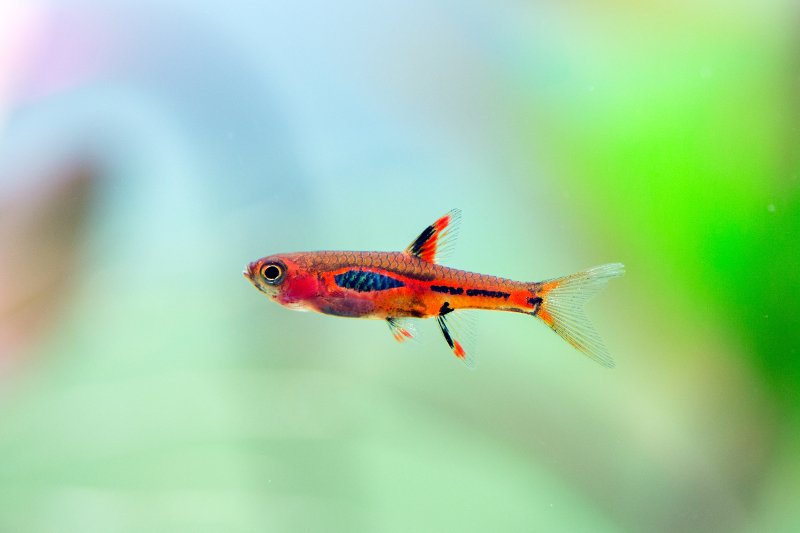
| Care level Moderate | Temperament Peaceful | Color Red and black | Lifespan 4 to 5 years | Size Up to 0.8 inches |
| Water temperature 68 to 82°F | Water pH 4 to 7 | Tank size 10 gallons | Diet Omnivore | Scientific name Boraras brigittae |
The chili rasbora is one of the smallest freshwater species in the pet trade, growing to only 0.6 to 0.8 inches at maturity. The fish is known for its vibrant red coloration, active personality, and entertaining schooling behavior.
Chili rasboras should be kept in groups of at least six. While hardy, these fish struggle against strong currents. Use a gentle filtration system and add decorations — like driftwood, plants, and caves — to disperse the current.
Zebra Danio
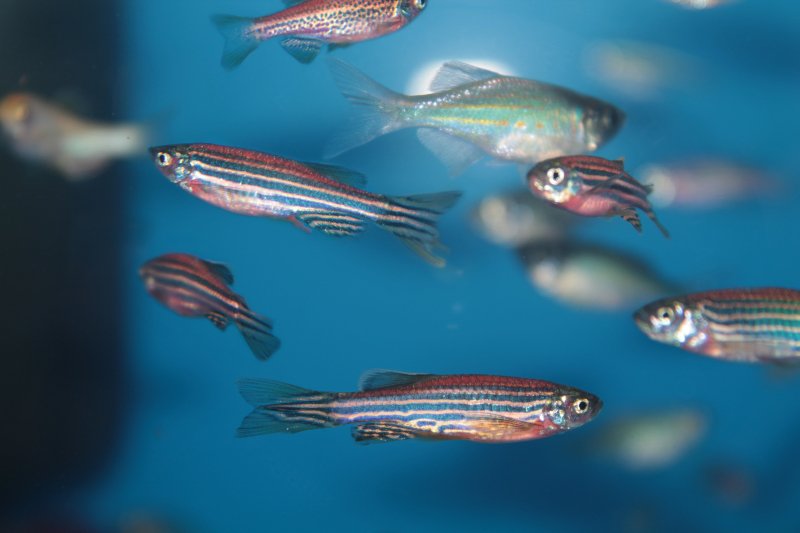
| Care level Easy | Temperament Peaceful | Color Silvery-gold with blue horizontal stripes | Lifespan 3 to 5 years | Size Up to 2.5 inches |
| Water temperature 64 to 77°F | Water pH 6.8 to 8 | Tank size 10 gallons | Diet Omnivore | Scientific name Danio rerio |
The zebra danio is a popular nano fish species native to the tropical waters throughout India, Bhutan, and Bangladesh. The fish’s most defining characteristic is its blue horizontal stripes that spread from gill to tail.
Zebra danios are active, docile, and have playful personalities. These fish are fast swimmers and spend most of their time in the upper levels of the tank. Although generally peaceful, zebra danios are fin-nippers and shouldn’t be housed with long-finned species. Keep zebra danios in small groups to let them engage in their natural schooling behavior.
White Cloud Mountain Minnow
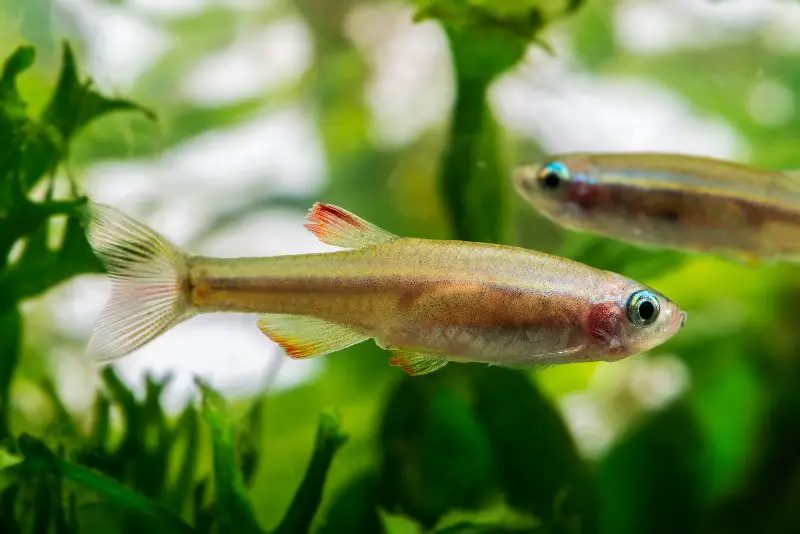
| Care level Easy | Temperament Peaceful | Color Variable | Lifespan 5 to 7 years | Size Up to 1.5 inches |
| Water temperature 64 to 72°F | Water pH 6.8 to 7.5 | Tank size 10 gallons | Diet Omnivore | Scientific name Tanichthys albonubes |
The white cloud mountain minnow is a top-dwelling fish that thrives in cool waters. While rare in the wild, this species is common in the pet trade because of its hardy nature and minimal care needs. White cloud mountain minnows come in a range of color varieties.
The white cloud mountain minnow does best in temperatures between 64 and 72°F. Add aquatic plants, hiding spots, and a smooth, rocky substrate in the fish’s tank. Keep the lighting dim to moderate.
Panda Cory
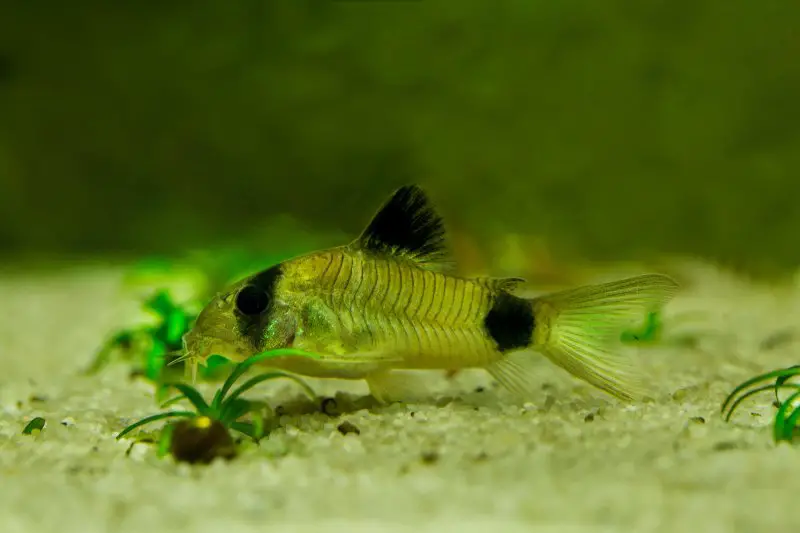
| Care level Easy | Temperament Peaceful | Color Variable, with spotted markings | Lifespan 10 years | Size Up to 2 inches |
| Water temperature 68 to 77°F | Water pH 6 to 7 | Tank size 10 gallons | Diet Omnivore | Scientific name Corydoras panda |
The panda cory is a peaceful, schooling species that inhabit the river streams of Peru and Ecuador in the wild. The panda cory reaches 2 inches in length, has distinctive panda-like, spotted markings, and is active at night.
Panda cories are tolerant of most water conditions, though they require dense vegetation and plenty of places to take refuge. Use a non-abrasive substrate because panda cories are bottom-dwelling fish.
Best Saltwater Nano Fish
Some popular saltwater nano fish species include the blue neon goby, ocellaris clownfish, geometric pygmy hawkfish, pajama cardinal, and tailspot blenny.
Blue Neon Goby
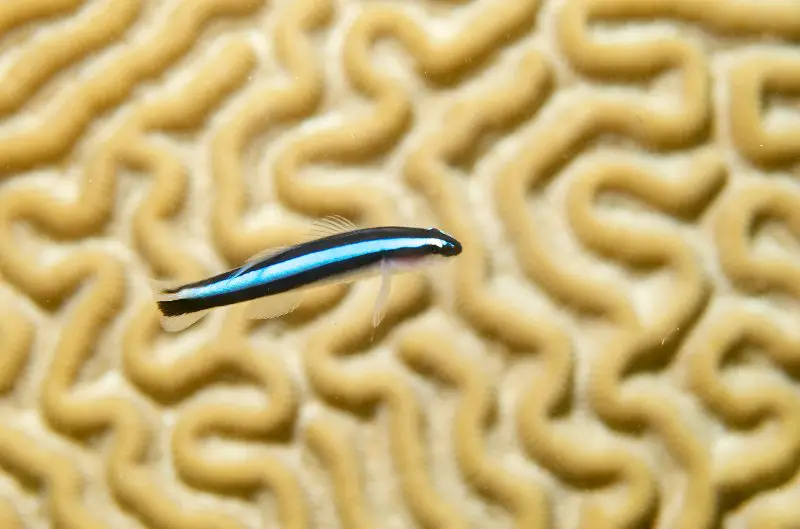
| Care level Easy | Temperament Peaceful | Color Dark body, blue stripe | Lifespan 1 to 2 years | Size Up to 2 inches |
| Water temperature 72 to 78°F | Water pH 8.1 to 8.4 | Tank size 10 gallons | Diet Carnivore | Scientific name Elacatinus oceanops |
The blue neon goby is a popular reef species that grows up to 2 inches in length. In the wild, the fish inhabits coral heads at depths between 1 and 45 meters. Blue neon gobies are known for their peaceful temperament, vibrant blue stripe that runs across their bodies, and ability to clean other fish.
Blue neon gobies thrive in slightly alkaline water at a temperature around 72 to 78°F. While generally peaceful, these fish exhibit territorial aggression and shouldn’t be housed together in small tank setups. Opt for a larger, 20-gallon tank when housing multiple blue neon gobies.
Ocellaris Clownfish
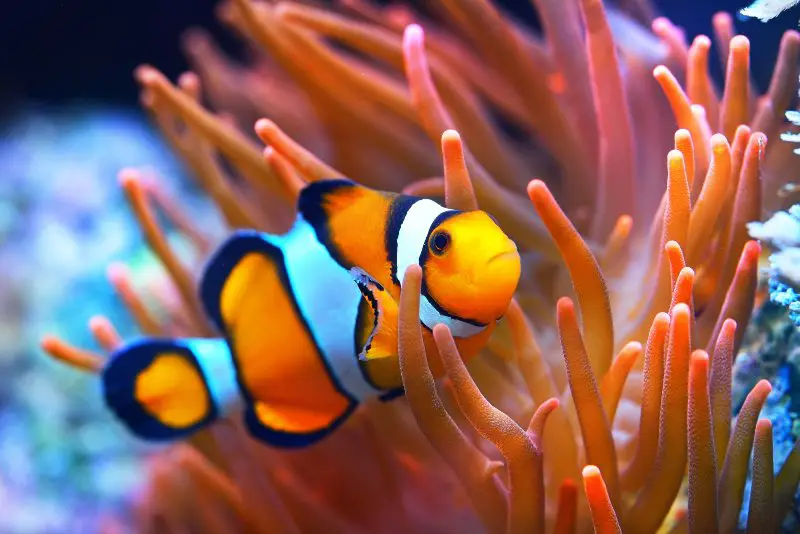
Care level Easy | Temperament Semi-aggressive | Color Variable, most common is orange body with white stripes | Lifespan Up to 20 years | Size Up to 3 inches |
|---|---|---|---|---|
| Water temperature 74 to 82°F | Water pH 7.8 to 8.4 | Tank size 10–20 gallons | Diet Omnivore | Scientific name Amphiprion ocellaris |
Ocellaris clownfish are native to the Pacific and Indian oceans, where they inhabit shallow waters and have a symbiotic relationship with sea anemones. Clownfish are popular in the pet trade because of their hardy nature and vibrant appearance. These fish typically have orange bodies, white stripes, and thick, black bands.
Ocellaris clownfish are relatively peaceful, but often fight with other clown species when protecting their territory or eggs. These fish require a varied, nutritious diet to thrive.
Geometric Pygmy Hawkfish
Care level Easy | Temperament Semi-aggressive | Color White and red geometric pattern | Lifespan 1 to 2 years | Size Up to 2 inches |
|---|---|---|---|---|
| Water temperature 72 to 78°F | Water pH 8.1 to 8.4 | Tank size 20 gallons | Diet Carnivore | Scientific name Plectranthias inermis |
The geometric pygmy hawkfish, also called the hi fin perchlet, is a deep water fish species that grows up to 2 inches. The fish gets its common name from its red geometric pattern that spans across its body.
Geometric pygmy hawkfish are relatively rare in the pet trade, but can sometimes be found in online stores or at expos. These fish are hardy, keep to themselves, and aren’t picky eaters. Geometric pygmy hawkfish require live rock and plenty of hiding spots to thrive.
Pajama Cardinal
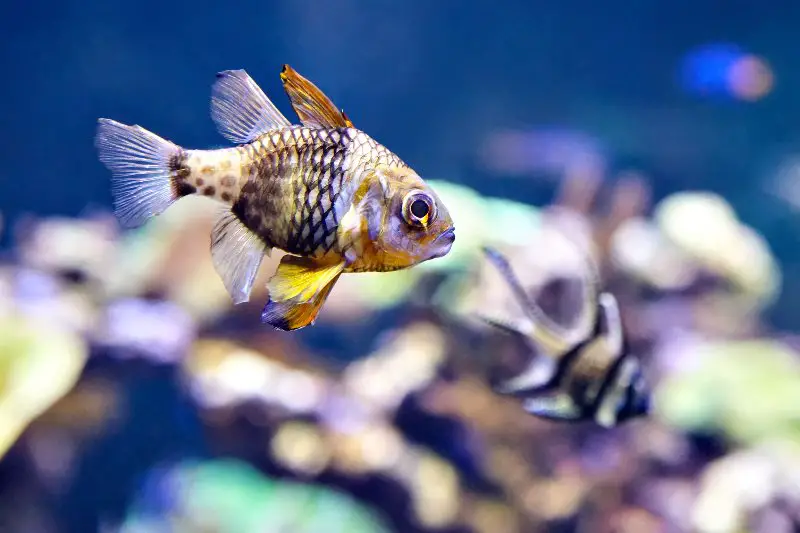
| Care level Easy | Temperament Peaceful | Color Green-ish yellow head with colorful polka dots | Lifespan 2 to 5 years | Size Up to 3 inches |
| Water temperature 72 to 79°F | Water pH 8.1 to 8.4 | Tank size 20 gallons | Diet Carnivore | Scientific name Sphaeramia nematoptera |
Native to the Western Pacific Ocean, the pajama cardinal is a saltwater species that resides in coral reefs and grows up to 3 inches. The fish is popular in the pet trade because of its colorful body, captivating swimming style, and peaceful temperament.
Pajama cardinals are sociable and get along well with other species. However, these fish are slow and shouldn’t be housed with boisterous or fast-moving fish. Pajama cardinals are nocturnal, so establish a day-to-night cycle in the tank with lighting and offer food at night.
Tailspot Blenny
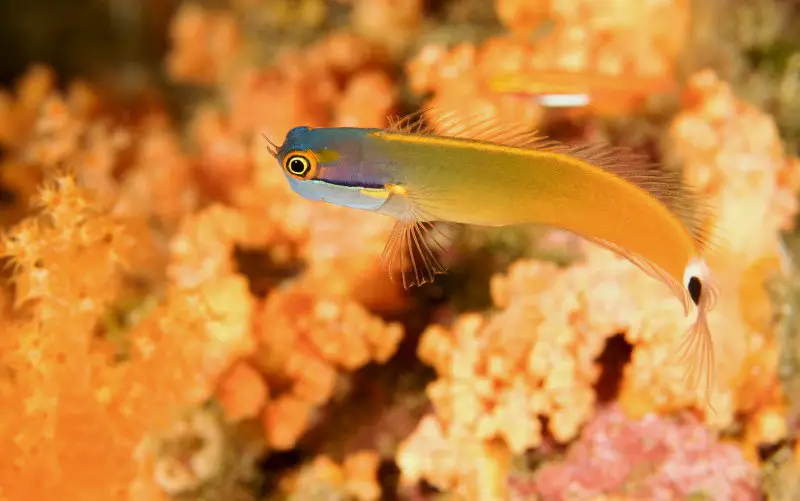
| Care level Easy | Temperament Peaceful | Color Copper-hued body with blue notes, can turn pink when threatened | Lifespan 2 to 5 years | Size Up to 2.5 inches |
| Water temperature 75 to 82°F | Water pH 7.8 to 8.4 | Tank size 10 gallons | Diet Omnivore (primarily herbivore) | Scientific name Ecsenius stigmatura |
The tailspot blenny is a captivating, copper-hued fish that can change its color when threatened. The species reaches 2.5 inches in length, has an average life expectancy of two to five years, and has a distinctive spot on its tail. In the wild, tailspot blennies are primarily found in coral reefs throughout Indonesia and the Philippines.
The tailspot blenny does best in a 10-gallon tank fitted with live rock and plenty of hiding spots. While the fish is omnivorous, its diet should mainly consist of plant algae. Don’t use a strong filtration system because this species is accustomed to slow-moving water.
Yellow Clown Goby
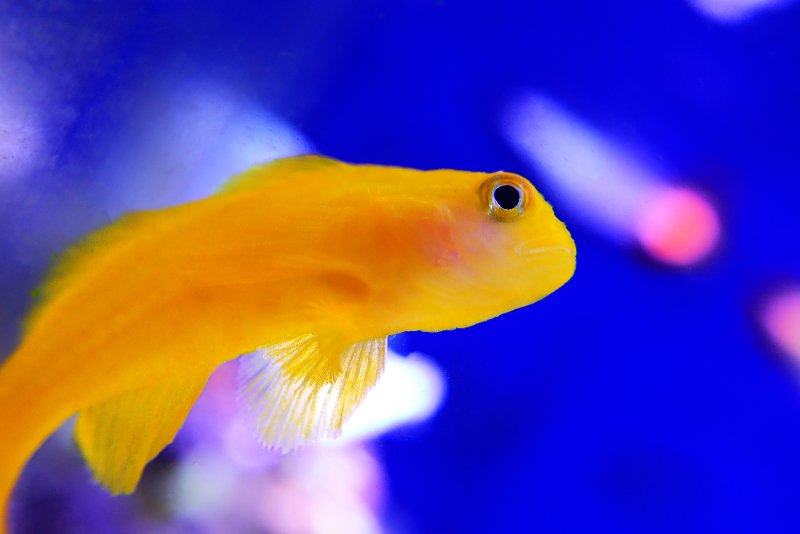
| Care level Easy | Temperament Peaceful | Color Yellow | Lifespan 2 to 6 years | Size Up to 1.5 inches |
| Water temperature 72 to 78°F | Water pH 8.1 to 8.4 | Tank size 10 gallons | Diet Carnivore | Scientific name Gobiodon okinawae |
The yellow clown goby, also known as the Okinawa goby, is a species native to Japan, Indonesia, and Australia. The fish lives among coral colonies in lagoons and grows up to 1.5 inches in length.
Clown gobies prefer to swim at the middle and bottom levels of the tank and enjoy perching on coral, among other structures. These fish are adaptable and peaceful with other species, but shouldn’t be housed with their own kind.
Clown gobies have voracious appetites and readily accept a variety of protein-rich, meaty foods, like brine shrimp.
Hector’s Goby
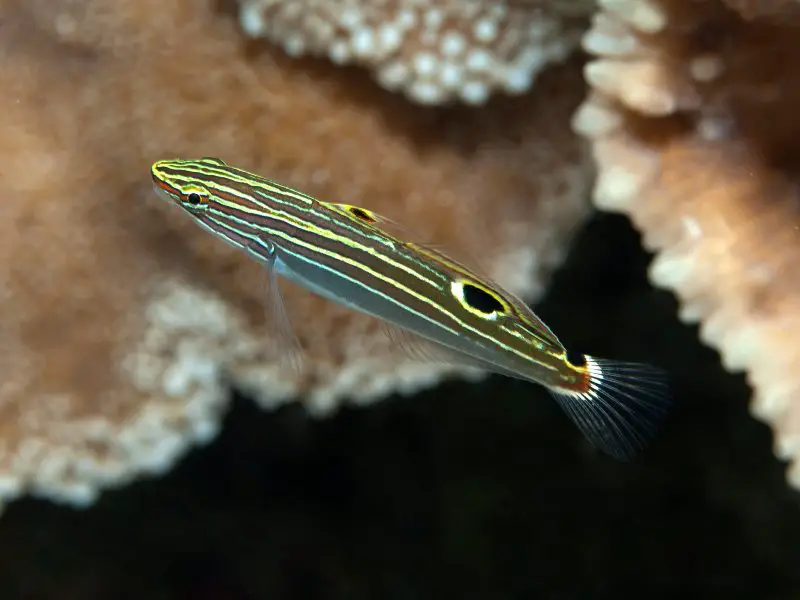
| Care level Moderate | Temperament Peaceful | Color Black with yellow stripes | Lifespan 2 to 3 years | Size Up to 3 inches |
| Water temperature 72 to 78°F | Water pH 8.1 to 8.4 | Tank size 10 gallons | Diet Omnivore | Scientific name Koumansetta hectori |
The hector’s goby is a dark-colored fish species with distinctive, yellow stripes that spread from snout to caudal fin. The fish grows up to 3 inches, inhabits sheltered coral reefs, and lives for two to three years with proper care.
Hector’s gobies spend most of their time sifting through sand and grazing on hair algae. These fish can live happily in 10-gallon tanks, as long as plenty of hiding spots are available.
Yellowstriped Cardinalfish
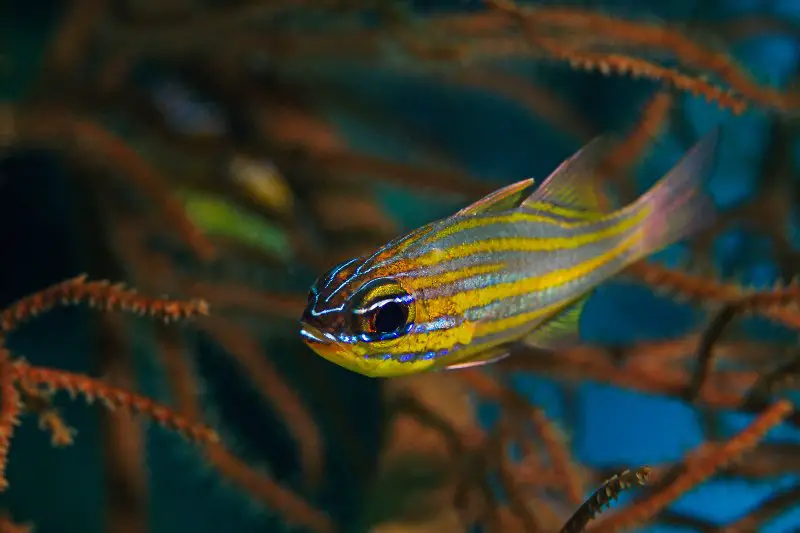
| Care level Easy | Temperament Peaceful | Color Silvery-white with yellow stripes | Lifespan 2 to 3 years | Size Up to 2.5 inches |
| Water temperature 75 to 82°F | Water pH 8.1 to 8.4 | Tank size 10 gallons | Diet Carnivore | Scientific name Ostorhinchus cyanosoma |
The yellowstriped cardinalfish is distributed across the Indian Ocean and Western Pacific, where the fish inhabits clear water lagoons or coral reefs. The species gets its name from its bold, yellow stripes.
Yellow-striped cardinalfish are popular among hobbyists because the species acclimatizes well, accepts dried foods readily, and has an entertaining swimming style.
Yellow-striped cardinalfish are active during the night and spend most of their time feeding on zooplankton. These fish are sociable, peaceful, and can be used as dither fish in larger community tanks.
Choosing & Caring For Different Types of Nano Fish
Nano fish might be small, but their bold colors and larger-than-life personalities can brighten up any home. Most nano species are easy to care for and can live comfortably in 10-gallon tank setups. However, schooling fish that thrive in groups, such as the cardinal tetra, fare better in 20-gallon tanks.
When choosing a nano species, always consider the tank’s parameters and whether you can accommodate the fish’s individual needs. First-time fishkeepers should avoid species that are sensitive to stress and water fluctuations, like the celestial pearl danio.
Nano species can be kept together as long as the tank is spacious and the fish are similar in size and temperament.

Be the first to comment